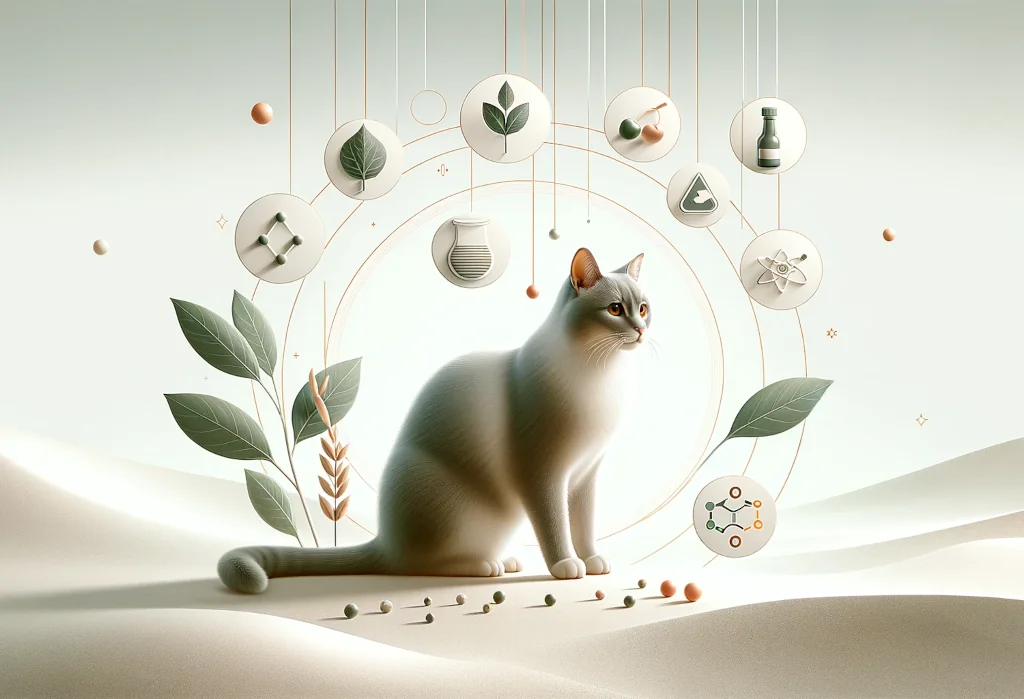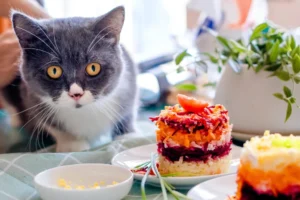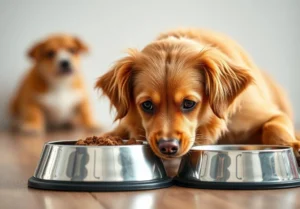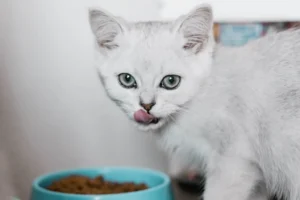Cats are peculiar creatures, aren’t they? One minute they’re zooming around like mini furry rockets, and the next, they’re sulking under the bed with the moodiness of a teen. Connecting the dots between their food bowl and their mood swings can feel like trying to decipher ancient scripts. This blog post is your secret decoder ring, revealing how nutrients directly influence your cat’s mood and activity levels.
Promise: By the end of this read, you’ll not just be astonished by the power of nutrition, but you’ll also be well-equipped to tweak your kitty’s diet for a happier, more active feline companion.
Key takeaways:
- Balance your cat’s diet with high-quality proteins and vitamins, particularly focusing on taurine, B vitamins, and Vitamin D for mood and energy.
- Include superfoods like lean meats, fish, pumpkin, and blueberries to supplement essential nutrients and promote playfulness.
- Improve your cat’s hydration with multiple water stations, cat water fountains, and integrating wet food into their diet for enhanced activity and happiness.
What Role Does Diet Play in My Cat’s Mood?
Ever noticed your cat turning into a bit of a grump or becoming overly jittery? Well, it’s not just the weather affecting their mood swings. Diet plays a pivotal role in shaping your cat’s emotional state, much like in humans.
Nutrition directly affects their physical health, which in turn, can dramatically alter their mood and activity levels. For instance, a deficiency in certain nutrients might lead to lethargy or irritability, while an excess of others could cause hyperactivity or aggression. It’s all about balance. Ensuring your cat’s diet is well-rounded with the right mix of proteins, fats, vitamins, and minerals is key to keeping them both happy and healthy.
Can Taurine Boost My Cat’s Energy and Happiness?
Taurine is like the superhero of nutrients when it comes to our feline friends. This essential amino acid is a big deal for cats – they cannot produce enough of it on their own and must get it from their diet. It’s vital for heart health, vision, digestion, and maintaining a strong immune system. But how does it affect their mood?
A taurine-rich diet supports a cat’s overall well-being, which can lead to more playful and energetic behavior. A deficiency, on the other hand, can cause serious health issues, including heart problems and blindness, which would understandably dampen any cat’s spirits. To keep your cat bouncing around happily, make sure their food has plenty of taurine. Most high-quality commercial cat foods are formulated to meet this need, but it’s always good practice to check the ingredients list.
A simple way to boost their taurine intake is by including a small serving of cooked, unseasoned chicken or fish in their diet.
What Vitamins are Key for a Jovial Cat?
Vitamins play a crucial role in mental health, regulating neurotransmitters and keeping your cat’s nervous system in check. When it comes to keeping your cat’s tail wagging, certain vitamins are non-negotiable:
-
B Vitamins: This group of vitamins is indispensable for a cat’s energy levels. Vitamin B12, for instance, supports brain health and helps maintain the nervous system. A deficiency in B vitamins can lead to lethargy and irritability.
-
Vitamin D: Often dubbed the “sunshine vitamin,” Vitamin D is crucial for mood regulation. Cats primarily get it from their diet, as they are not as efficient at synthesizing it from sunlight as humans. It supports the immune system and helps combat mood fluctuations.
-
Vitamin A: This vitamin is essential for maintaining good vision, skin, and coat health, which all contribute to a cat’s well-being and mood.
Ensuring your cat receives a diet with these vitamins can help maintain a stable mood and high energy levels. Interestingly, Vitamin D’s role in mood regulation is often overlooked in cats. However, ensuring they get enough (but not too much, as Vitamin D can be toxic in high doses) can make a noticeable difference in their happiness.
Remember, while it’s important to focus on these nutrients, a balanced diet tailored to your cat’s age, health, and lifestyle is crucial. Consider consulting with a vet for personalized dietary advice to keep your cat not just feeling good, but purring with joy.
Are There Superfoods That Make Cats More Playful?
You bet! When it comes to jazzing up your feline friend’s life, several superfoods can turn the dial up on their energy and happiness. Let’s dive into a few ingredients that are not only nutritional powerhouses but also have a noticeable impact on your cat’s mood and activity levels. Remember, while these foods can be excellent additions to your cat’s diet, they should complement a balanced diet, not replace it.
-
Lean Meats: Cats are obligate carnivores, meaning their bodies are designed to thrive on meat. Chicken, turkey, and lean beef are packed with high-quality protein and essential amino acids like taurine, which is crucial for heart health, vision, and a robust immune system. Incorporating cooked (always unseasoned and boneless!) lean meats into your cat’s diet can boost their energy levels, making them more inclined to play and engage.
-
Fish: Omega-3 fatty acids found in salmon, tuna, and sardines are not only beneficial for your cat’s coat and skin health but also play a role in brain function. This could contribute to better mood regulation and more playful behaviors. However, it’s essential to serve fish in moderation and cooked without any harmful additives.
-
Pumpkin: This might surprise you, but pumpkin is a fantastic superfood for cats. Its high fiber content can aid digestion and help prevent hairball issues, which, in turn, keeps your cat feeling light and frisky. A small spoonful of pure, unsweetened pumpkin puree can make a big difference.
-
Blueberries: As a unique suggestion, blueberries (in moderation) could be a delightful treat for your cat. They’re rich in antioxidants and vitamins C and K, which support the immune system and contribute to overall vitality.
Quick Tip: A unique gem not widely mentioned is sprouted barley grass – safe for cats, these greens are packed with nutrients and can help freshen breath and provide a gentle mood boost through improved digestion and nutrient absorption.
How Does Hydration Influence My Cat’s Activity Level?
Hydration is the unsung hero of a cat’s health and well-being. Ensuring your cat stays well-hydrated is crucial for maintaining energy levels and a sunny disposition. Cats, by nature, have a low thirst drive, which means they don’t always drink enough water, leading to potential lethargy and moodiness. Here’s why water is so important and how you can make sure your cat gets enough of it.
Water facilitates virtually every bodily function — from digestion and waste removal to nutrient absorption and circulation. Dehydration, even in mild forms, can quickly sap your cat’s energy, leading to decreased activity levels and a cranky mood.
Encouraging More Water Intake:
-
Multiple Water Stations: Place several bowls of fresh water around your home. Cats may be more inclined to drink if water is readily accessible in the spaces where they spend most of their time.
-
Running Water Appeals: Many cats prefer drinking running water as it seems fresher to them. Consider a cat water fountain, which not only encourages your cat to drink more but also keeps the water circulating and filtered.
-
Wet Food Diet: Incorporate wet food into your cat’s diet. It has a higher moisture content compared to dry food, which can help increase your cat’s overall hydration levels.
-
Flavor Boost: For a cat that’s particularly stubborn about drinking water, try adding a little flavor. A small amount of low-sodium chicken broth or tuna water (make sure there’s no added salt or seasonings) can make their water bowl more enticing.
Remember, your cat’s water bowls should be cleaned daily to keep the water fresh and appealing, and be sure to replace water regularly. Staying hydrated is about more than just avoiding dehydration; it’s about boosting energy levels and keeping your cat’s mood as chipper as a bird in the springtime.
In conclusion, superfoods and adequate hydration play pivotal roles in your cat’s emotional and physical health. By incorporating these tips into your cat care routine, you’re not just nourishing their body; you’re nurturing their happiness and zest for life. Keep an eye on these aspects, and you’ll likely see a more playful, content, and thriving feline companion sharing your space.
Alex, a passionate animal lover, has experience in training and understanding animal behavior. As a proud pet parent to two dogs and three cats, he founded AnimalReport.net to share insights from animal experts and expand his knowledge of the animal kingdom.





